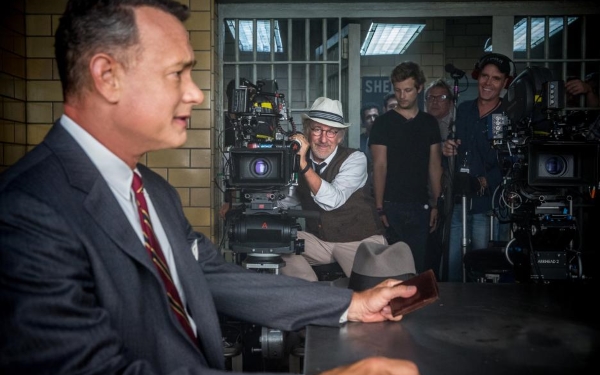When Rudolf Abel was arrested for sending coded messages to back Mother Russia, the U.S. government asked Brooklyn insurance lawyer James Donovan to represent the alleged spy—a task Donovan begrudgingly accepted. After all, defending a Soviet agent during the Cold War 1950s is bad for business.
In any case, Donovan (Tom Hanks) failed to win Abel an acquittal, but convinced the Judge to rule against the death penalty, reasoning that Abel (Mark Rylance) might one day make a valuable bargaining chip.
Sure enough, when an American U-2 spy plane is shot down over Soviet airspace, and pilot Francis Gary Powers (Austin Stowell) lands in a Russian prison, Donovan is sent to Berlin to negotiate a spy swap. The geopolitical stakes are further raised when Donovan learns how American grad student Frederic Pryor (Will Rogers) was detained in East Berlin, and Donovan consequently campaigns for the release of both Americans, in exchange for Abel.
This real-life triple prisoner exchange caught the attention of British screenwriter Matt Charman, who wrote Bridge of Spies as a result. Not that he ever expected his idol Steven Spielberg to direct his screenplay, or the Coen brothers to polish it.
Creative Screenwriting spoke to Charman about his odds-defying experience.
As a Brit, what was it about James Donovan’s American story that captured your interest?
A great character is a great character, wherever they’re from, right? I always loved American history – especially the Kennedy White House and the Cold War period, and I read the Robert Dalleck book An Unfinished Life, which talked about this American lawyer sent to Cuba by JFK to negotiate with Fidel Castro for the release of the 1,500 servicemen captured after the Bay of Pigs. A footnote said “James Donovan came to prominence for the role he played in the spy swap between Rudolf Abel and Gary Powers”, and I thought, “Hang on. Stop. Who is this guy?”
So I started digging and I pieced together this remarkable untold story about a genuine American hero who risked his life to pull the world back from the brink, during the most dangerous point in the Cold War. It became an odyssey for me to tell this story. I met with Donovan’s son in a coffee shop in New York, and it was a very emotional meeting because he knew how serious I was, and I knew how much his father meant to him.
Did Donovan’s son believe his father’s legacy was neglected?
He felt that his dad was not a showy guy or an arrogant guy, and he wasn’t in it for anything but the right reasons. History tends to forget those people, so the idea of his dad’s story finding an audience in a new generation excited him. I came out to L.A. and did seven twenty-minute verbal pitches a day – the whole story, with all the characters and every twist and turn. We started to get some interest, there was a little bidding war and DreamWorks bought it. I was walking on air. I flew home and had an answering machine message that said “Steven Spielberg would like to hear this idea directly from you, please call us back.”
What was your initial reaction to this message?
My initial reaction was to get very hot and sweaty. During the call, I stripped down to my boxer shorts and T-shirt. I had an E.T. poster on my wall, and every new movie he put out, a new poster went up. So to suddenly be pitching a story I cared passionately about, to a man who actually lived through this story, was an amazing thing. And at the end of the pitch, he was like “I love this. How fast can you write it?” It was just like, wow.
You’re credited as the main writer, but Joel and Ethan Coen did their own polish. Was there any addition or subtraction that really perturbed you?
There really wasn’t. It would be a juicier story it there was, but the truth is, I got lucky so many times on this movie. I wrote a draft, I got notes from Steven Spielberg, then after my second draft, Tom Hanks came aboard, and then I get a call from Steven saying, “The Coen brothers love this story and want to polish it.” As a young screenwriter, Steven Spielberg, Tom Hanks and the Coen brothers working together—that’s the most incredible film school you could ever have.
Tell me about the Coens’ contribution.
They were able to really punch up the negotiations on the back end of the movie, then they handed the baton back to me to do a pass after they did their pass, to make the movie just sit in a place we all wanted it to. The flavor they brought is so fun and enjoyable. It needed to be entertaining but truthful.
So the Coen brothers were delicate about polishing your work?
I didn’t say that. The Coen brothers are two of the best living screenwriters, and the reason I love their movies so much is that they come at scenes from such an interesting angle. It makes you raise your game as a collaborator.
When writing 1957-era dialogue, are there any resources for checking what words and phrases would have been spoken at that time? Obviously James Donovan isn’t going to talk about taking a selfie.
I’ve written period for British television, set in the 1930s, and with period writing, you just need to tune into it. I read literature from those times and I watched movies set in those times, so it felt natural to talk in those people’s voices.
What about the vocabulary differences between America and England? A Brit would say “I need a toilet,” where an American says “I need a restroom”.
I don’t even think about it. It’s a “restroom”. If you love American cinema like I do, you’re just immersed, so it’s almost like switching from a Southern accent to a Boston accent. It’s just a few clicks in your mind and a few little calibrations.
And when you’re writing for military personnel describing specs of a U-2 spy plane, with technical terms like “10,000 pounds of thrust”, do you consult a weapons guy to nail the accuracy of the jargon?
Yes, a huge amount of research goes into that, because you not only want it to be right, but you want it to sound right. And in truth, there are things that that we might consider to be military speak that would never be expressed that way. So you first have to find the actual details of what you want to express, and then ask people, “How would you actually express the power of an engine? Do you speak in abbreviations?” Because I think people can smell a rat.
It’s like medical shows, where you know when something has been carelessly written or when something has been learned from a doctor. It either smells a bit fishy or it smells 100% right.
During the spy swap, when Abel is about to be handed back to the Russians, he says they’ll either embrace him or show him the back seat of the car – the latter meaning he’ll be killed by his own people. But Abel is in fact shown the back seat and isn’t killed. Was his rhetoric just a red herring to raise the dramatic stakes?
The truth of it was, Abel didn’t really know whether he was going to last the night. They knew there were snipers all around, and there was a feeling that maybe Abel would be shot, and that Gary Powers would be grabbed back. So to not serve that tension and the bravery of a man walking into a potential assassination by the people he used to work for, and to not have an audience confront that sense of fear would have been a mistake.
Finally, you sidestepped a huge cliché, when James Donovan develops a brutal cold, but survives it. Normally, a character’s cold is a preamble to their death, like Kate Winslet in Finding Neverland, or in Victorian novels, where someone coughs, then dies of consumption soon after. Was Donovan’s cold added to fake viewers out?
It’s from reality. It was so cold in East Berlin during the negotiations, that Donovan caught pleurisy. And he was negotiating through the most hellish bad health. I felt strongly that that needed to be in there. And I also loved that this is just a guy who wants to get this done and get home to a warm bed. There’s something that felt so universal about that. But I know what you mean. We’ve all watched those movies where we say, “Uh-oh, that’s not just a headache!”







